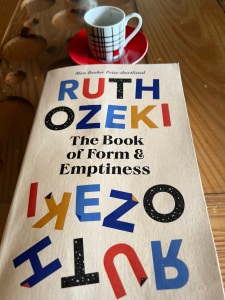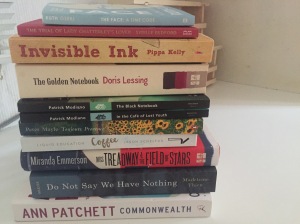
Ruth Ozeki's fifth novel begins in the 1990s. It tells the story of Benny Oh, a fourteen-year- old who begins hearing voices after the death of beloved father, Kenji Oh, a jazz musician, a clarinetist. The voices belong to the things in his house. He does not understand what these voices are saying but he can sense their emotional tone. As a response to bereavement, his mother, Annabelle develops a hoarding problem.
When Annabelle first met Kenji, she was doing a master's degree programme in Library Sciences as she had dreamed of becoming a librarian since young. But she had to give it up when Benny was born. She first worked at a national media-monitoring agency as a scissors lady who had to speed-read the stacks of local town and state newspapers, and then clipped articles to send to the clients on topics relevant to their interests.
Benny adored the father and he was the anchor for the family despite his drug problem. He died in an accident. One night as he was nearing his house, he fell and was too stoned to move. A chicken truck ran over him mistaking him as a sack of garbage lying on the ground.
After Kenji's tragic passing, chaos takes over the house. Annabelle is trying to keep her job because digital technology has changed the way news get disseminated and she is worried about getting laid off. In the meantime, not only she cannot get rid of the news archives that she had kept for her job, she acquires used things that they do not need and further clutter their home. Benny hears noises at home and everywhere he goes. He also hears voices in class. When a pair of scissors tells him to stab his teacher, he turns the blade on himself and he ends up being sent for psychiatric treatment. His doctor is Dr Melanie who is clueless and diagnoses “schizoaffective disorder,” and prescribes mind-curdling drugs. When his condition does not improve, he is sent to a psychiatric institution.
At the psychiatric unit, he meets, Alice, a young artist who calls herself the Aleph. She writes anonymous messages on scraps of paper. One of her little notes directs Benny to the old public library, where he can seek refuge in its silence and where objects know to behave and speak only in whispers. There he becomes acquainted with Slavoj a homeless Slovenian poet called the B-man described as the Bottleman, and at the same time he has a crush on the Aleph aka Alice.
Alice tells Benny that the hobo is not crazy.
“It’s not him that’s crazy,” she tells him. “It’s the … world we live in. It’s capitalism that’s crazy. It’s neoliberalism, and materialism, and our … consumer culture that’s crazy.”
Alice makes globes and she thinks they are crap. Benny thinks they are beautiful and says to her,
" How can you be an artist if you don't make stuff?'

Alice regards Slavoj as her mentor and quotes him and says that they should get out on the streets and disrupt the status quo and change the way people normally see things. She wants to focus more on unmaking.
The Book of Form and Emptiness is a Zen parable. Inside the novel, there is a book that talks to Benny. It claims to be Benny's own book. It narrates Benny's life and tells him to listen to the things that truly matter.

THE BOOK
'Yes. of course. You had an important philosophical question to answer - What is real? - and were so preoccupied with the nature of your own reality, you were oblivious to know your mother might be experiencing hers. But that's okay. It's perfectly natural. Children have a limited ability to understand a parent's inner life, perceiving it through the lens of their own subjectivity and understanding only as much as impacts them. Children are remarkably obtuse that way, but not to worry,. This is not a criticism or a reprimand. You were younger then, and we are not a scolding kind of book. There's nothing worse than books that scold. Nobody wants to read them. We are simply pointing out a well-documented developmental fact. There are many books on the subject of child development, but we are not one of them. Let's move on.'
'Benny? Are you there? Are you still not talking?
You can try to block us, but the memories are still in you, and we know where to find them.
All right, fine. You leave us no choice. We’ll just have to continue without you.'
‘Is it odd to see a book within a book? It shouldn’t be .Books like each other. We understand each other. You could even say we are all related, enjoying a kinship that stretches like a rhizomatic network beneath human consciousness and knits the world of thought together. Think of us as a mycelium, a vast, subconscious fungal mat beneath a forest floor, and each book a fruiting body. Like mushrooms ,we are a collectivity. Our pronouns are we , our , us. Because we’re all connected , we communicate all the time -agreeing and disagreeing, gossiping about other books, name-dropping, and quoting each other – and we have our preferences and prejudices, too. Of course, we do ! Biases abound on library shelves. The scholarly tomes disparage the more commercial books. Literary novels look down on romance and pulp fiction, and there’s an almost universal disregard for certain genres, like self-help’
After experiencing a great deal of physical and emotional pain, Benny finally embarks on his hero’s journey to reclaim his own story.

Ruth Ozeki is a novelist, film maker as well as a Zen Buddhist priest.The Book of Form and Emptiness has won the 2022 Women's Prize( formerly known as the Orange Prize). It is a beautiful tale about present-day living.
thereadingroom374231461.com/2022/09/11/books-glorious-books/click
No comments:
Post a Comment